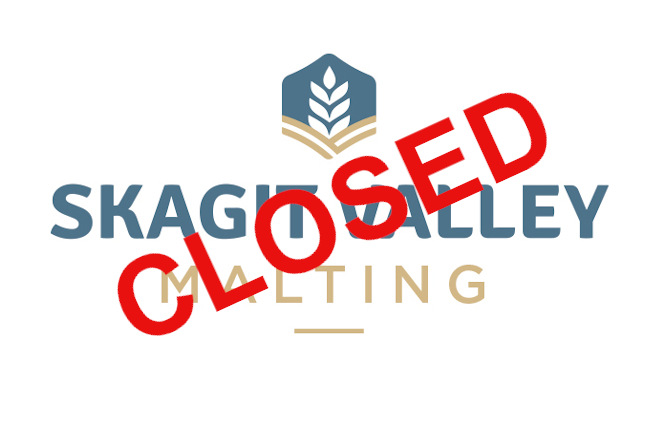The company’s listing on Google now reads “Permanently closed.”
Last Thursday, employees of Skagit Valley Malting were called into an all-hands meeting. At the meeting, the CEO announced that it was “the bad meeting” and told the employees that the company’s board of directors had voted to file for bankruptcy. Everyone at the meeting, everyone who worked for Skagit Valley Malting, was suddenly unemployed effective immediately. Sources say the company has filed for Chapter 7 bankruptcy.

Eric Buist, who was the Marketing Manager at Skagit Valley Malting until last Thursday, says that he knew there was some financial trouble, but everyone was working hard to help the company succeed. The customer base was growing, he said, with the company onboarding as many as ten new customers per month. “It was not a complete shock, but it was a shock at that moment,” he said.
Ripple Effect
Employees at the company are suddenly jobless, but beyond that immediate human toll, there is a ripple effect. Unless it was shipped before last Thursday, Buist presumes that any existing orders will go unfulfilled, leaving the company’s customers to fend for themselves and shop elsewhere. At its closing, Skagit Valley Malting supplied about 272 breweries and distilleries with a variety of different kinds of malted barley, some of which are not readily available from alternate sources.
Skagit Valley Malting popped into existence in 2011. Many farmers in the Skagit Valley agricultural region began growing barely (often as a cover crop) because of Skagit Valley Malting’s existence. The relationship between those growers and the company was tight. It was symbiotic. According to Good Beer Hunting, at the time of its closing, the company had contracts with local growers for about 3.5 million pounds of barley, estimated to be worth about $500,000. What those farmers do next remains to be seen.
What Happened and What’s Next?
Financial pressures began to build toward the end of last year, explained Buist. The company pays its suppliers (farmers) for the barley when it is harvested and those bills had to be paid. At the same time, the company had committed to bringing two more malting machines online and those were in production. Another big bill to pay and more money going the wrong way.
Buist told me that he knew the company had some unsuccessful attempts to secure more financing and was looking for grants and other investment opportunities, but he did not believe things were so dire as to file for Chapter 7 bankruptcy. (Read more about the financial struggles facing craft maltsters on Good Beer Hunting.)
Presumably, whatever malted barley is ready to ship will now be sold to help repay creditors under the terms of Chapter 7 bankruptcy. Buist said that, as far as he understands, a couple of employees have been retained for the time being, but he assumes that is just to pack up the business for sale.
A Chapter 7 bankruptcy is quite different than a Chapter 11 bankruptcy. Under the terms of Chapter 11, a business is allowed to reorganize and maintain day-to-day operations while creating a plan to repay creditors. A Chapter 7 bankruptcy, also known as liquidation bankruptcy, doesn’t require a repayment plan but does require the company to sell its assets to pay creditors. Buist was told that Skagit Valley Malting had filed a Chapter 7 bankruptcy, which is why the entire thing came to such an abrupt end last Thursday.
Buist told me that at last Thursday’s meeting, someone asked, “What do we tell our customers?” In response, that person was told, “We’ll figure it out.”
A lot of good people, with great connections in the brewing and distilling industries, worked for Skagit Valley Malting. This was not their fault. “Everyone worked their butts off trying to keep things going and help the company,” said Buist. “Apparently it wasn’t enough.”


































This is very disappointing. Sounds as if the board miscalculated big time and ran the ship aground. All of the products I used from skagit malting made excellent beers and having this local source will be sorely missed.
This is a major tragedy for breweries who were trying to do locavore, “made and brewed in WA” beers, as well as some distilleries trying to do the same. Are their any other suppliers of Washington malt?
Indeed there are other WA producers, but I am not sure how well they’ll be able to meet demand. Especially for the more interesting stuff Skagit did.
Country malt group sells a WA select malt that is entirely grown in WA.
That is a bummer! I loved their malt, and used a ton of it! I lost my brewery due to bad timing on an expansion so completely empathize with the situation, and am sorry for the staff and crew. Wish I could help!
The Skagit team fostered connection between local farmers, maltsters, brewers, distillers, and beyond for a decade plus. Truly sorry to hear this.